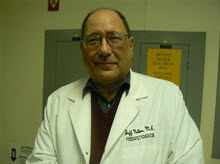
(HealthNewsDigest.com) - Malibu - March 3, 2014 - There's an old saying in the food business - it's better to find a whole roach in your food than a half a roach. The experts at Tellem Grody PR's (TGPR) Food Issues Group (FIG) agree, but point out that there are a number of other items that restaurateurs may hear diners complaining about. While accidents happen, it's better to do due diligence before the bad thing occurs by monitoring the work area so that foreign objects don't enter the food preparation or food service areas. Here are some items to watch for and their fixes:
Metal fragments. Toss old dull blades or gears from the can opener, and keep an extra set handy.
Buttons from kitchen uniforms. Order clothes with snaps.
Rust/flaking paint. It may be a chip off an old mixer. Check aging equipment frequently.
Threads. If your towels are shredding, demand new ones from your laundry service.
Dirt/dust. Clean the tops of equipment, dust from air vents, accumulations under shelves; toss mops and brooms that have seen better days; clean filters in ice machines.
Hair. Wear hats/hairnets or restraints.
Nail polish or fake eye lashes. Remind the staff to check cosmetic additions regularly.
Insects. Wash produce properly and close windows without fly protection.
Screws. Caution repair people to count their inventory of screws when making repairs; staff must report missing screws in the kitchen equipment.
Glove tips. Use extreme care when chopping foods. Some diners think they're condoms so it is very serious. For the same price order blue gloves, which makes it much easier to see when it falls into the sauce or food.
Staples/pins. Staples shouldn't be in the kitchen near open food. Pins that hold up kitchen orders fall out and bounce on the floor and into food. Use magnets instead.
Broken equipment. Replace old fryer baskets and strainers where wires break and fall into the food. Replace handles n old tongs.
Metallic fragments. Replace aging scrub pads with 3M nylon pads.
Broken glass. Glass shards fly 6-8 feet from point of impact at the bar meaning the ice and garnishes may be suspect. Require a broken glass report to investigate improper handling or to correct bad habits.
FIG pairs TGPR partner Susan Tellem, APR, RN, BSN, who has 30 years of crisis management experience with Jeff Nelken, MA, RD (retired), an experienced professional in all aspects of food safety and inspection. Restaurants, theme parks, hotels, casinos, as well as corporate and school cafeterias can all have accidental items in their food service.
Nelken says it is critical to avoid these problems. "Chefs have a saying - everything in its place - and this works for restaurant owners as well. Nowadays with Yelp and twitter, untoward items in restaurant foods become public knowledge almost as they happen, and lawsuits follow closely behind. With the explosive growth in fast food restaurants and fast casual places, safe food handling is even more important." He adds that you cannot depend on auditing companies to solve your problems. Three of the largest food poisoning outbreaks had third part inspections shortly before having major outbreaks and received outstanding scores. One of the auditing companies is being sued by clients that received outstanding scores. In the meantime, they were convicted for the deaths and making hundreds ill.
Tellem says that a brand can suffer and ratings drop when people find items in their food that they weren't expecting. "Instagram, twitter and Facebook are a montage of weird items people photograph when they find something icky in food. It's best to be prepared by reviewing best practice for food handling and these tips can surely help the restaurant maintain its 'A' grade and minimize lawsuits." She added that just like nurses and doctors do in the health professions, food companies and restaurants should do the same - document, document, document, because if it isn't documented, it never happened.
Jeff Nelken, MA, retired RD is a Food Safety / HACCP Expert with 35 years experience in the hospitality industry. He specializes in Food Safety, Accident Prevention, Inspections, Audits and Training. Mr. Nelken is a certified trainer and provider with the Los Angeles Health Department who has worked with CNN, FOX, CBS, NBC, INSIDE EDITION, and Dateline MSNBC's investigation team, as well as Restaurants, Casinos, Schools, Supermarkets, and Food Manufacturers to provide food safety.
©Copyright - All Rights Reserved
DO NOT REPRODUCE WITHOUT WRITTEN PERMISSION BY AUTHOR.











